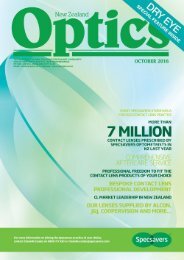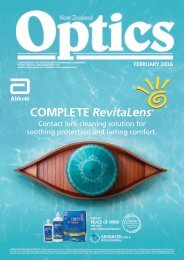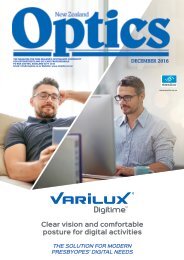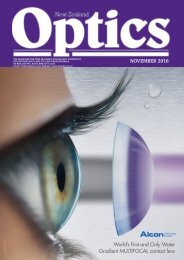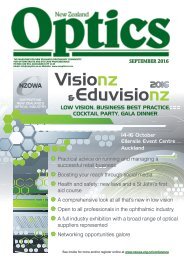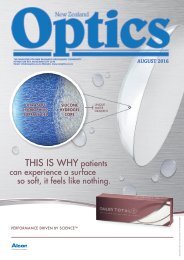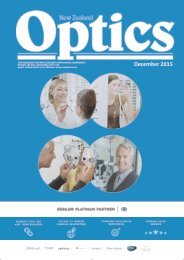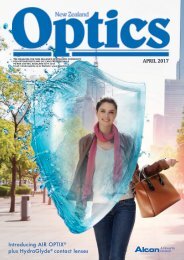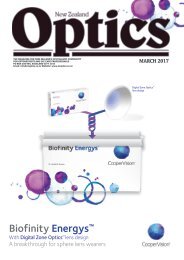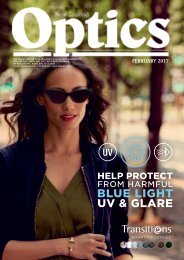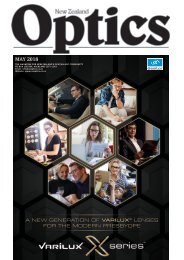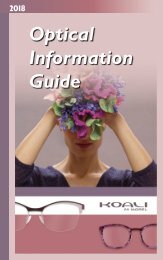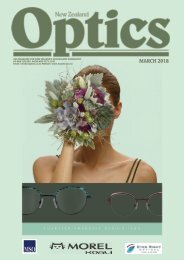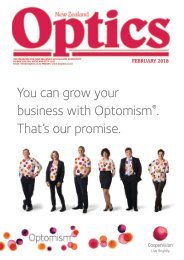You also want an ePaper? Increase the reach of your titles
YUMPU automatically turns print PDFs into web optimized ePapers that Google loves.
World class eye centre opens<br />
in Solomons<br />
Fred Hollows Foundation staff from left: Lucy Dryden, Konio Szetu, Celia Parry, John Szetu, Andrew Bell, Marleen<br />
Nelisse and Craig Fisher<br />
The Hon Prime Minister Manasseh<br />
Sogavare of the Solomon Islands opened<br />
the region’s first Regional Eye Centre in<br />
the country’s capital, Honiara.<br />
The Centre provides free eye care to all citizens<br />
and doubles as a training hub for visiting eye<br />
care professionals.<br />
Officially launched on July 22, the Centre<br />
represents a partnership between the Solomon<br />
Islands, the New Zealand government and<br />
The Fred Hollows Foundation NZ. The site was<br />
designed by award winning New Zealand firm<br />
Bossley Architects and built by local contractors.<br />
The Centre’s lead ophthalmologist, Dr Claude<br />
Posala, says he is thrilled to see the facility<br />
launch after all the extensive consultation and<br />
planning.<br />
“The Centre’s design and construction is<br />
incredibly high quality. Ninety-four per cent of<br />
the Centre’s power comes from solar energy<br />
and the building materials will last 50 years. I’m<br />
proud to say we have the most advanced eye<br />
care facility in the Pacific.”<br />
Dr Posala says the Centre will help prevent<br />
avoidable blindness in the country. “In Solomon<br />
Islands, as in the wider Pacific region, four out<br />
of five people who are blind don’t need to be—<br />
their condition is preventable or treatable.”<br />
Twenty-one Solomon Island eye nurses and<br />
four eye doctors have so far graduated from The<br />
Foundation’s Pacific Eye Institute in Fiji.<br />
“The Solomon Island government has shown<br />
great commitment to building the country’s eye<br />
health systems. Their graduates are amongst the<br />
best and brightest in the Pacific, and now they<br />
have a facility befitting of their specialist skills,”<br />
says Andrew Bell, executive director for The Fred<br />
Hollows Foundation.<br />
Eye care professionals from the region can<br />
gain further specialist knowledge at the<br />
Centre, which will also run mobile clinics in<br />
neighbouring Pacific nations.<br />
In its first year alone, the Centre will double<br />
the number of sight-saving surgeries performed<br />
in the Solomon Islands. The New Zealand<br />
Government has invested more than $4.1 million<br />
in the facility, with additional funding coming<br />
from the World Diabetes Foundation, the Queen<br />
Elizabeth Diamond Jubilee Trust and The Fred<br />
Hollows Foundation NZ. O<br />
OBITUARY<br />
Sydney-based optics giant, Brien Holden<br />
Internationally renowned optics researcher<br />
and philanthropist Professor Brien Holden<br />
died on July 27, aged 73, sending ripples<br />
from his home in Sydney throughout the<br />
world of optics and beyond.<br />
Holden was a teacher, researcher and<br />
humanist, who held a lifelong interest in<br />
bringing healthcare to developing nations, a<br />
passion that resulted in the organisation that<br />
now bears his name, the Brien Holden Vision<br />
Institute (BHVI), for which he served as CEO<br />
until his death.<br />
“I have huge respect for what Brien achieved<br />
in his lifetime,” says Paul Rose, a Hamiltonbased<br />
Optometrist and contact lens developer<br />
who flew to Sydney for Holden’s funeral. “My<br />
association with Brien goes back many years<br />
now and I remember well our first encounter<br />
back in the early 70s. He will be a difficult man<br />
to replace.”<br />
Holden was known for his pioneering work<br />
in soft contact lenses, beginning in the early<br />
1970s at the School of Optometry of the<br />
University of New South Wales where he was<br />
a lecturer. There he led a team of postgraduate<br />
students in determining what was needed<br />
in contact lenses to maintain eye health.<br />
Their work drew wide interest, prompting the<br />
group to move beyond the original goal of<br />
understanding the effects of contact lenses<br />
on the cornea to all aspects of contact lenses<br />
from lens design, material properties and<br />
performance to the effects of a wide range of<br />
ocular devices, procedures and contact lens<br />
solutions on the eye.<br />
Holden is credited in the co-development<br />
of the silicone hydrogel contact lens which<br />
makes up more than half of all contacts used<br />
worldwide.<br />
He was awarded an Order of Australia Medal<br />
in 1997 for his work in eye health and vision<br />
science.<br />
BHVI today is a non-profit organisation that<br />
has established hundreds of eye care sites<br />
around the globe, provided optometric services<br />
to more than two million people and trained<br />
nearly 50,000 eye care personnel.<br />
Optometry Ball<br />
University of Auckland optometry<br />
students enjoyed a night out at<br />
Alexandra Park for the annual<br />
Optometry Student Ball. The August 6<br />
event saw students, staff, and significant others<br />
Professor Brien Holden<br />
“Brien’s efforts and achievements have<br />
been recognised, applauded and adopted<br />
worldwide,” says BHVI Chair Brian Layland.<br />
“All who have worked with him will have fond<br />
memories to cherish; all will miss him. His<br />
legacy will encourage all to strive to achieve<br />
the goals he had set.”<br />
Holden is survived by wife Yvonne, three<br />
children, and four grandchildren.<br />
BHVI appoints interim CEO<br />
The Brien Holden Vision Institute (BHVI) has<br />
appointed deputy CEO, Professor Kovin Naidoo<br />
as interim CEO. Naidoo was a co-founder of the<br />
Clear Vision Optical franchise and has served<br />
in many elected/voluntary positions including<br />
Africa Chair of the International Agency for the<br />
Prevention of Blindness. A Fulbright Scholar,<br />
Naidoo was awarded a PhD from the University<br />
of New South Wales, a Doctorate of Optometry<br />
from the Pennsylvania College of Optometry,<br />
a Masters in Public Health from Temple<br />
University and a BSc and BOptom degree from<br />
University of Durban-Westville. He was African<br />
Optometrist of the Year in 2002, International<br />
Optometrist in 2007, and was jointly awarded<br />
with Holden the Schwab Social Entrepreneur<br />
Award for Africa 2010. O<br />
dress up as pirates, with James Li and Rosa<br />
Sun taking prizes for their outfits. The event<br />
was sponsored by Specsavers, Eye Institute,<br />
NZAO, Luxottica, Designs for Vision, Optimed,<br />
CooperVision and Corneal Lens Corporation. O<br />
Prime Minister Rt Hon Manasseh Sogavare gets an<br />
explanation of the centres solar power by David<br />
Pollard from What Power Crisis?<br />
The Fred Hollows Foundation NZ Regional Eye Clinic in<br />
Honiara, Solomon Islands<br />
Health tracking in a pair of specs<br />
US-based VSP Global claims to have<br />
developed the first wearable<br />
prototype of optical frames integrated<br />
with health-tracking technologies.<br />
Project Genesis features sensor technology<br />
housed within the temple of a pair of Dragon<br />
Alliance frames, allowing the wearer to track<br />
steps, calories burned, activity time and distance<br />
travelled via an app developed in-house, and<br />
synced via Bluetooth.<br />
The app and integrated frames were developed<br />
in secret over 12 months by VSP Global’s inhouse<br />
laboratory, the SHOP, under the leadership<br />
of Jay Sales and Leslie Muller.<br />
“Eyewear has been the most successful piece<br />
of ‘wearable technology’ for over 700 years,”<br />
says Muller. “With Genesis, we’re now adding<br />
additional value into the frame, but doing so in<br />
a seamless, fully integrated design that creates a<br />
richer experience for the wearer.”<br />
SHOP is beta testing the prototype with<br />
26 VSP Global employees at the company’s<br />
Californian headquarters. Participants give<br />
real-time feedback to SHOP engineers and<br />
designers, allowing for rapid improvements to<br />
The tracking device is built into the frame’s temple<br />
the prototype’s initial hardware and software<br />
designs.<br />
“Wearable technology is exploding right now,<br />
some of it could be considered hype, some of it<br />
could be considered the start of a personalised<br />
medicine revolution,” says Sales. “The Genesis<br />
prototype is a first step at providing a deeper<br />
level of contextualised health data through<br />
a device a large portion of people are already<br />
utilising every day.” O<br />
Back row from left to right: Rahul Kumar and Sayed<br />
Shuaib; Centre: Annie Wang, Dexter Low, Janet<br />
Chung, Huimin Dai, Lexia Ahkit and Sean Mahendran.<br />
Front: Divya Anthraper and Brinda Mamidi<br />
From Left to Right: Costume prize winner Rosa Sun<br />
with Alyssa Lie, LeiLei Zhou, Jingyi Xu, and Michelle Ko<br />
(Standing, left to right) Tyler Duncan, Robert Burnie, Katarina Marcijas, Chad Walker; (middle, seated): Marna<br />
Classen, Gemima Ji, Menaga Manokoran, Alice Jackson, Sharni Killoran, Kayleigh Aspeling; and (centre, in<br />
repose) Ken Turner<br />
<strong>Sep</strong>tember <strong>2015</strong><br />
NEW ZEALAND OPTICS<br />
19



